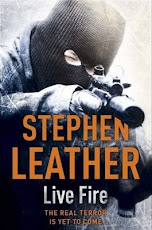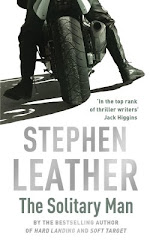When I was in my twenties and wanted to be a writer, I read pretty much everything by Jack Higgins, Len Deighton and Gerald Seymour. And the more I read, the more I began to think that if I worked hard enough and learned the craft, that I might one day be able to write the sort of books that they write. But I also read everything by John Le Carre, and the more I read of his work, the more I realised I would never be as good a writer as he is.
Now, forty years later, I like to think that I am just about in the same league as Jack Higgins, Len Deighton and Gerald Seymour. But when I pick up a new Le Carre, I’m always brought back to earth. After some thirty years earning my living as a thriller writer, I can see that I will never be as good a writer as the master..
I’ve just finished reading Le Carre’s latest - Agent Running In The Field - and wanted talk about it. (SPOILER ALERT - If you haven’t read it and think you might, don’t read any further as I will talk about the plot and the ending!)
It’s a great read, I stormed through it in a few days and read it late into the night. The writing is, as always, superb, and the characterisation is awesome, as are his descriptions of people and places. He writes at a totally different level to me. I’m not worthy.
So what I am posting about it? It’s not by way of criticism, it’s more a case of trying to get my thoughts in order and to see what everyone else thinks.
Here’s one thing that troubled me. Everyone in the book is rabidly anti-Trump and anti-Brexit. Everyone. There is no balance. Now, I’m not necessarily a fan of balance. My editor asked me to put in a favourable Somali person in my thriller about Somalian pirates, and I did understand and agreed even though I felt it wasn’t necessary. And generally I have Spider Shepherd to provide a more balanced view when faced with characters spouting extremist opinions be they right, left, racist or homophobic. But there is no one in this book to provide an opposing view. I just felt it was tiring being constantly told that only idiots supported Trump or wanted to leave the EU. And it felt to me that if you write like that you risk alienating half your readers!
The other issue I had was the plot. The ending made absolutely no sense to me. The hero - Nat- and his wife, help the would-be traitor Ed escape with his new wife, Flo. They sneak him out of a building and into a car they have rented and drive him to an airport. The idea is that Ed and Flo run away to start a new life somewhere in Europe. Wait, what? They have no money, no fake documents, how exactly are they going to do that? Fifty years ago it might have been possible to start a new life as easily as that, but these days? And Nat has openly helped a would-be traitor to escape. That means he and his wife are headed for prison. There’s no thought of what the repercussions will be. And would Ed’s alternative, of staying in place and becoming a double agent, be so bad? A few years of that and he could leave and start a new life with the blessing of the UK authorities. I really didn’t understand the ending. Or was I missing something? If you have read it, please let me know what you think!
But it was the tradecraft, I think, that worried me the most. In his early books I loved the operating secrets that he revealed, dead drop letter boxes, secret meetings, counter-surveillance measures, I always felt that he was telling me stuff that I really wasn’t supposed to know. But in this latest book, most of the tradecraft seems to be stuck back in the Seventies. Do agents still put secret papers in hollowed-out handles of badminton rackets? Do foreign spies still receive coded messages using one-off code pads? Do they listen to overseas radio stations to get their coded instructions? At one point Nat is wary of the phone extension in his bedroom. But he is happily carrying around a mobile that his bosses have given him. Doesn’t he realise that even when switched off it is capable of storing and transmitting everything heard in its vicinity? Doesn’t he know that lasers can pick up vibrations on his window and turn that into sound? The bedroom landline is the least of his worries.
He wants to contact a former spy and his way of contacting her is to write a note, sneak into her building, pop it through the letterbox and knock and run away. He then waits for her to join him on a bench. But he didn’t even know if she was home.
It was all very strange, as if spies from the 60s and 70s had been transplanted to the present day and who ignored all the technological advance that have been made over the decades. These days a landline is the last place you’d put a bug, and encrypted mobiles and websites are a safe way of communicating generally. A burner smart phone and a few WhatsApp accounts will do the job…..
Anyway, I did love the book, it entertained me and made me think, so job done. I’d love to hear any other opinions on it!







































No comments:
Post a Comment